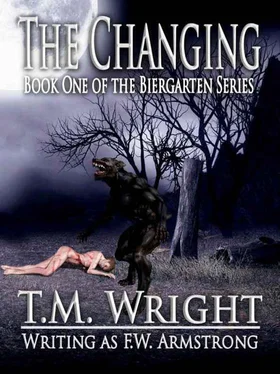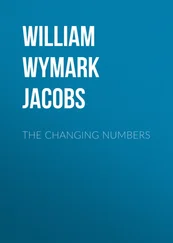T. Wright - The Changing
Здесь есть возможность читать онлайн «T. Wright - The Changing» весь текст электронной книги совершенно бесплатно (целиком полную версию без сокращений). В некоторых случаях можно слушать аудио, скачать через торрент в формате fb2 и присутствует краткое содержание. Жанр: Ужасы и Мистика, на английском языке. Описание произведения, (предисловие) а так же отзывы посетителей доступны на портале библиотеки ЛибКат.
- Название:The Changing
- Автор:
- Жанр:
- Год:неизвестен
- ISBN:нет данных
- Рейтинг книги:5 / 5. Голосов: 1
-
Избранное:Добавить в избранное
- Отзывы:
-
Ваша оценка:
- 100
- 1
- 2
- 3
- 4
- 5
The Changing: краткое содержание, описание и аннотация
Предлагаем к чтению аннотацию, описание, краткое содержание или предисловие (зависит от того, что написал сам автор книги «The Changing»). Если вы не нашли необходимую информацию о книге — напишите в комментариях, мы постараемся отыскать её.
The Changing — читать онлайн бесплатно полную книгу (весь текст) целиком
Ниже представлен текст книги, разбитый по страницам. Система сохранения места последней прочитанной страницы, позволяет с удобством читать онлайн бесплатно книгу «The Changing», без необходимости каждый раз заново искать на чём Вы остановились. Поставьте закладку, и сможете в любой момент перейти на страницу, на которой закончили чтение.
Интервал:
Закладка:
"How?"
Miller grinned. "He turned inside out, I think.”
“Good Lord," Ryerson breathed.
"Just like Jack Youngman did."
And the same image blasted into Ryerson's head: a man lying twisted, broken, squashed.
Miller said, still grinning, "Jack Youngman turned inside out. It was fatal." He chuckled deep in his chest, like a bulldog might, if it could chuckle.
"That was today, too?" Ryerson asked.
"Yes," Miller answered. He'd stopped grinning; he was speaking simply, dispassionately. "That was today. Dixon was today. Youngman was today, too. So was McCabe." His grin returned; it was lopsided and threatening. "And so is Biergarten."
Ryerson caught his breath. Another image was pushing into his head, an image he wanted desperately to stop, but couldn't-an image of something amorphous, something the color of dirty cream, something that moved like a tidal wave inside this creature who called himself Douglas Miller, something that filled his insides and gobbled him up and moved him about as if he were some grotesque marionette. And all the while the man, Douglas Miller, the Kodak Park employee, Greta Lynch's would-be lover, former high school athlete, was himself squashed, beaten, murdered.
My God, Ryerson thought, the man is dying!
"And today," the man said, "is Biergarten."
"Like hell it-" Ryerson began, intent upon lung-ing from the room and out into the night.
But Douglas Miller beat him to it. Douglas Miller screamed-in much the way that he'd screamed at the hospital, when the orgasm had wracked him-and threw himself from the chair and out of the room.
Creosote began to whimper.
Ryerson sat open-mouthed for several seconds. Then he called, surprising himself, "Wait! No! Miller! Wait!" And with Creosote whimpering under his arm, he vaulted from the room in crazy pursuit.
Chapter Twenty-two
When he got down to Birr Street, Ryerson saw Miller lurching toward Lake Avenue. He was a good one hundred feet off, but the street was well-lighted by new streetlamps, and Ryerson could see, as Miller passed under first one, then another, then another streetlamp, that the man was changing-growing taller, wider, his gait becoming less awkward, more graceful-more profoundly and impossibly graceful.
"Miller!" Ryerson called.
And then the change began to reverse itself. The profound gracefulness became, by degrees-as Miller was illuminated beneath first one then another of the streetlamps-an awful, stiff lurching movement; then the man lost his height, lost his bulk, became clearly something stick-like rattling around inside his clothes.
That's when he turned the corner onto Lake Avenue and Ryerson lost sight of him.
It was early evening, and there were people on the street. Walking toward him, a middle-aged woman in a huge gray cloth coat-though the temperature was in the sixties-caught his gaze stiffly, held it for a few seconds, looked away, and passed by. On the opposite side of the street a couple in their twenties walked hand in hand, and Ryerson got a quick feeling of peace and harmony from them. And at the end of the street, a boy was coming his way on a bicycle. Ryerson waited for him, forced a smile, and held a hand out to stop the boy when he was twenty yards off. The boy stopped; Ryerson saw that he had a basket with several newspapers in it The Rochester Times Union, the city's evening paper. The boy said with a friendly smile, "Want a paper, mister? I got a couple left."
Ryerson shook his head. Creosote, who had come back to life, grunted and gurgled. "No," Ryerson said. The boy looked disappointed. "Okay," Ryerson amended and dug some change from his pocket.
"You okay?" the boy asked.
"Yeah, sure," Ryerson answered, aware that he was trembling. "Here." He gave the boy a quarter, took a newspaper from him, rolled it up, shoved it into his back pocket.
"Thanks," the boy said and began to pedal away.
"Wait," Ryerson said, put a hand out and grabbed the handlebar.
The boy looked suddenly frightened. "I only got a couple a dollars, mister. You want it, you can have it-"
"No, please," Ryerson said. "I don't want to rob you. There was a man-" he nodded toward Lake Avenue-"down there. A tall man-"
"Yeah," said the boy. "I saw him. He looked like a scarecrow."
"Yes," Ryerson said; he wished to God that he could stop trembling. "Yes," he repeated. "Did you see where he went?"
"Uh-huh," said the boy, and didn't elaborate.
"Where?" Ryerson asked, a little too sharply, he realized, because the boy winced. "I'm sorry. Please. Where did the man go?"
"Into the church," the boy answered.
"What church?"
"At the corner. The church that burned. He went in there."
Before the night of August 16, 1975, the Church of St. Januarius at the corner of Birr Street and Lake Avenue had been one of Rochester's oldest, most venerable, and certainly one of its largest churches. Its massive gray stonework had been the pride of the neighborhood, and in its heyday the church had served a congregation that numbered nearly 3,000 people. On any given Sunday, it could have seated most of them.
But on that Saturday evening, August 16, 1975, a fire began in the basement of the church and spread quickly upward through the oak floors, the cherry pews, the walnut altar. The huge stained-glass windows melted from the incredible heat. The iron confessionals were reduced to great, black amorphous globs. And by morning, August 17, 1975, all that remained of the once-magnificent structure were its massive stone walls, its stone foundation, two dozen stone passageways that snaked maze-like through the cellar, and incredibly, the huge oak front doors. For years there was talk of rebuilding the church. Various money-raising schemes were hatched and plans drawn up, but these schemes and plans never reached fruition. And when Ryerson Biergarten got there, in pursuit of Douglas Miller, the remains of the Church of St. Januarius were less than a month away from demolition.
Ryerson approached the church from the street side, up the twenty wide stone steps to the great oak doors-the only wood in the building that had survived nearly unscathed the awful kiss of the flames-stopped there, and whispered to himself, "I'm a fool!" He meant it. Because he knew that if he were not a fool he'd have called Detective Andrews, or he'd have flagged down a passing patrol car-and indeed, one had passed on its way to Edgemont Street, which paralleled Lake Avenue, as he'd made his way to the church from the Samuelson Guest House-or, at the most, he'd have hidden somewhere near the church, waited for poor Douglas Miller to reappear, and then would have decided what to do next. But he knew what he was going to do. He was going to seek Douglas Miller out in that maze of stone passageways. He was going to follow the monster underground.
He knew the passageways were there because, for whole seconds at a time, he could see them through what served as Douglas Miller's eyes: he saw two vague, gray planes that were cut by the dark horizontals and verticals of doorways that had once led into rooms where church school was held, and benefit suppers eaten, and Bingo played. And Ryerson could hear, too, the slight, muted echoes of past events-the Bingo games, the suppers, the church school-which lingered for decades in places like this.
"Miller!" he called through the half-open front doors of the church. Beyond them a wide section of charred oak floor remained. Several yards to the right of the doors, a stone stairway led into the snakelike maze of passageways beneath. Again Ryerson called, "Miller!" but heard nothing. He sensed someone watching him from the street and turned his head. A short, thin, dark-haired man wearing horn-rimmed glasses was watching him with passing interest. The man called, "You'd best not go in there. It's dangerous. Damned kids!" Which was a reference to the fact that although the authorities regularly boarded up the doors, children in the area had consistently broken in.
Читать дальшеИнтервал:
Закладка:
Похожие книги на «The Changing»
Представляем Вашему вниманию похожие книги на «The Changing» списком для выбора. Мы отобрали схожую по названию и смыслу литературу в надежде предоставить читателям больше вариантов отыскать новые, интересные, ещё непрочитанные произведения.
Обсуждение, отзывы о книге «The Changing» и просто собственные мнения читателей. Оставьте ваши комментарии, напишите, что Вы думаете о произведении, его смысле или главных героях. Укажите что конкретно понравилось, а что нет, и почему Вы так считаете.












